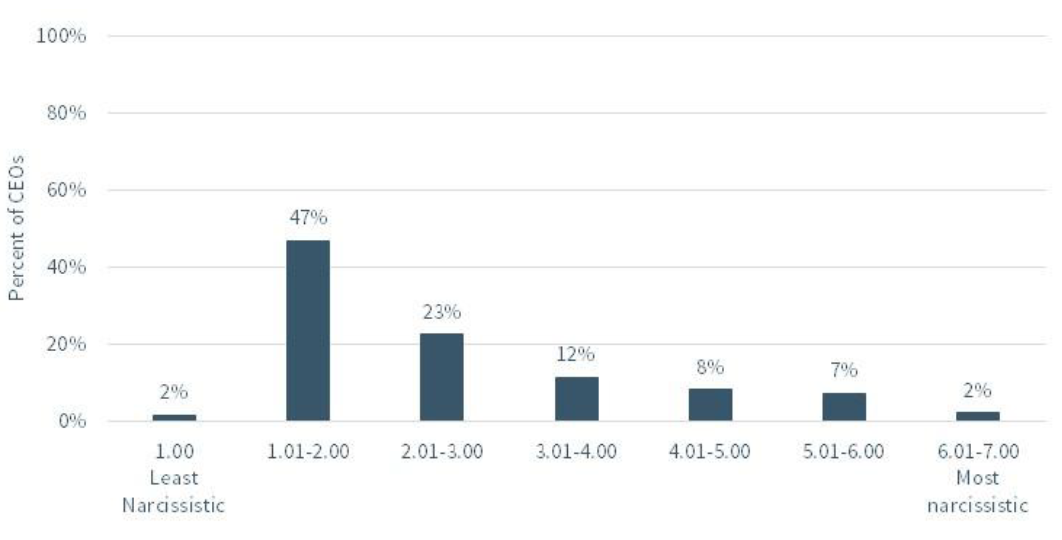
Would you know a workplace narcissist if you saw one?

Narcissism is a term that is banded around a lot, but what does a true narcissist actually look like?
A narcissist is someone who has delusions of grandeur, a constant need for admiration, and a lack of empathy for others. Narcissistic individuals often have an exaggerated sense of self-importance, believe they are special or unique, and expect to be recognized as superior to others without reason. They may exploit others to achieve their own goals, lack insight into their own behaviour, and react badly when criticized or challenged.
Narcissists can be toxic within a workplace and as such recognising these behaviours can help to avoid further issues arising. In a 2022 study for the NHRD Journal, (Palo & Subramanian), participants were asked about narcissism in the workplace and how successful narcissists were, their responses were very interesting:
“If the organisation is tolerant and encourages narcissistic behaviours, then those behaviours get reinforced. In meetings or in large groups narcissistic expressions are a reflection of being given the permission or license to display such behaviours and indicates encouragement.”
“Narcissism is rampant in organisations. Many a times, it is fed by the organisation culture that focuses too much on results regardless of its impact on employees’ wellbeing.”
“Narcissists are successful in a few cases as they are visionaries and very well conversant with how to get work done. However, you cannot run an organisation successfully if it is bursting with narcissists.”
Narcissism, in its true form, is a personality disorder and as such whilst the individual can not necessarily control their behaviour, it is worth knowing how best to handle or deal with such individuals. The study above and other research into narcissism suggest the following ways to combat the behaviours of a narcissist:
It is interesting to note that within the study detailed above, narcissistic leaders were considered to be effective during times of crises, however in nurturing and building relationships within a team, this was where they struggle. There are many studies that suggest that many senior executives have narcissistic tendencies and that it is these tendencies that have got them to senior roles. However, these individuals are only as good as the team they surround themselves with (although they would not necessarily admit that).
A Harvard study found that the prevalence of narcissism within senior executives was not as prevalent as media would suggest and in fact the majority of CEO’s that participated within the research did not many narcissistic traits at all as can be seen in the table below, the basis is a scoring of 1-7 based on a short version of the Narcissistic Personality Inventory test with 1 being low narcissism and 7 being high.

Whilst many people have some of the traits that can be classed as narcissistic, this does not mean that they are all narcissists. Narcissism, like many things, can be considered a spectrum. However, it is worth knowing how to address these behaviours when they present themselves.
Should you wish to see how you may score on the NPI, a short version can be seen below with the narcissistic responses in bold.
|
1. |
___ |
I really like to be the centre of attention |
|---|---|---|
|
|
___ |
It makes me uncomfortable to be the centre of attention |
|
|
|
|
|
2. |
___ |
I am no better or worse than most people |
|
|
___ |
I think I am a special person |
|
|
|
|
|
3. |
___ |
Everybody likes to hear my stories |
|
|
___ |
Sometimes I tell good stories |
|
|
|
|
|
4. |
___ |
I usually get the respect that I deserve |
|
|
___ |
I insist upon getting the respect that is due me |
|
|
|
|
|
5. |
___ |
I don't mind following orders |
|
|
___ |
I like having authority over people |
|
|
|
|
|
6. |
___ |
I am going to be a great person |
|
|
___ |
I hope I am going to be successful |
|
|
|
|
|
7. |
___ |
People sometimes believe what I tell them |
|
|
___ |
I can make anybody believe anything I want them to |
|
|
|
|
|
8. |
___ |
I expect a great deal from other people |
|
|
___ |
I like to do things for other people |
|
|
|
|
|
9. |
___ |
I like to be the centre of attention |
|
|
___ |
I prefer to blend in with the crowd |
|
|
|
|
|
10. |
___ |
I am much like everybody else |
|
|
___ |
I am an extraordinary person |
|
|
|
|
|
11. |
___ |
I always know what I am doing |
|
|
___ |
Sometimes I am not sure of what I am doing |
|
|
|
|
|
12. |
___ |
I don't like it when I find myself manipulating people |
|
|
___ |
I find it easy to manipulate people |
|
|
|
|
|
13. |
___ |
Being an authority doesn't mean that much to me |
|
|
___ |
People always seem to recognize my authority |
|
|
|
|
|
14. |
___ |
I know that I am good because everybody keeps telling me so |
|
|
___ |
When people compliment me I sometimes get embarrassed |
|
|
|
|
|
15. |
___ |
I try not to be a show off |
|
|
___ |
I like to show off if I get the chance |
|
|
|
|
|
16. |
___ |
I am more capable than other people |
|
|
___ |
There is a lot that I can learn from other people |